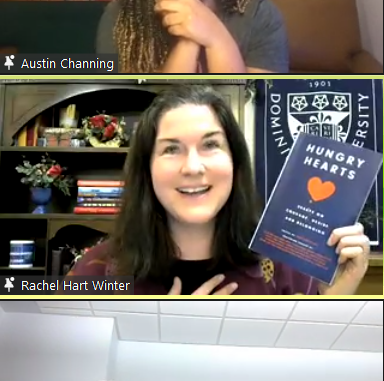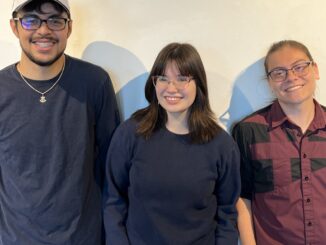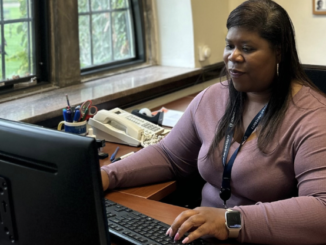
By Litzi Duran
Contributing Writer
From Chicago to California, viewers of last Wednesday’s webinar had the opportunity to hear Austin Channing Brown open up on the social justice struggles activists face.
The New York Times best-selling author, educator and social justice activist gave students tips on how to overcome the obstacles that come with social justice work to keep fighting for change.
As Dominican moves forward with its Black History Month events, around 200 guests joined the online webinar on Feb. 9. Rachel Hart Winter, director of the Siena Center, and Barrington Price, vice president of Student Success and Engagement, were the main organizers of the event.
Price and Austin have been friends since they met in college at North Park University. Both Winter and Price believed inviting Austin to lecture, “I Am Still Here: Black Dignity in A World Made for Whiteness,” would provide students with truth, an understanding of how to work towards justice, and healing.
Finding Joy in A World of Darkness
Austin opened the lecture with topic of finding joy when engaging in social justice work, especially as a Black woman in America.
“Joy can be hard to find in the pursuit of justice,” Austin Said. “The fight for justice will be full of disappointments in terms of people failing to provide you with the change you hoped they would influence. From teachers to politicians, you have been disappointed by them.”
When students decide to go into the field of social justice work, they will be exposed to the imperfections of the world, she said. Often times, the work of justice may seem like a losing game in the long run as a result of the constant disappointments that they will face.
Austin explained that the work of social justice will consist of having to engage in difficult conversations that can make people feel uncomfortable to talk about. Some of the topics of these conversations can involve slavery, lynching, and police brutality. Regardless of this, finding joy while committed in this work is not impossible.
One way to achieve joy in this field is through refusing to let one’s humanity be diminished, she said.
“I think that is huge part of our justice work and sometimes that work is so outfacing by trying to convince someone else of our humanity that we forget to embody our own humanity ourselves, to enjoy the food we create, to enjoy our people, to enjoy our music, to enjoy our community,” she said. “The work of justice isn’t always outside of us, sometimes the work of justice is inside of us and is taking the time to delight in who we are.”
Another method of hers to find joy is knowing the audience you are speaking to. Austin opened up about how unhappy she was in the past trying to prove her humanity to white people. She eventually realized that what brought her the most joy was centralizing the experiences of Black women and people of color and making her lectures a learning experience for both white and people of color.
The Importance of Introspection
Price shifts the conversation by bringing up the topic of introspection, a topic that Austin discusses in her book, and the role it plays in social justice work.
“White supremacy tries to make people of color monolithic,” Austin said. “The way it tries to distill us down to one thing, is the same thing is happening to the work of justice that there’s only one way to approach it. One way to do it. One role you are supposed to have.”
She shares how she was ashamed in the past for being a writer. She felt that being a writer was not enough to prove that she was a real fighter for social justice. It was through introspection that she realized that being an organizer is not the only way to achieve social justice. The key is for an individual to always be thoughtful of the platform they use for their social justice work.
Holding onto Hope
Price asked Austin, “How do you continue to hold onto hope, to joy, amidst all the difficulties which is change?”
Austin responded, “The joy I have found is that I do this work for myself. I am worthy of justice. I am worthy of equal rights. I am worthy of experiencing humanity. I am worthy! I am not bowing down to white supremacy. I am not allowing white supremacy to take away my humanity.”
Austin closed the conversation with the topic of humanity and how in certain circumstances, it is important for people to put themselves first over their work.
“I think it’s important to feel that humanity. Sometimes you have the energy to fight, and sometimes you want to be left alone,” she said. “Your whole life is not just justice work. I want us to give ourselves permission to say that we are exhausted and that we need something else. I want to give us permission to not always have to fight.”
Burnout often causes people to walk away from the work of justice due to how long it takes to see results. The fight for justice will not be easy but Austin reminds students how vital it is for them to keep on going.
“What I want most for students in particular, is that you not burn out,” she said. “That you not become so involved in the work of justice and so jaded by the absence of justice that you walk away. We need you … I need you to come out to change the world.”
lduran1@my.dom.edu



